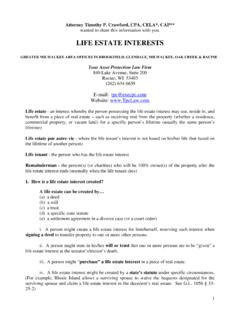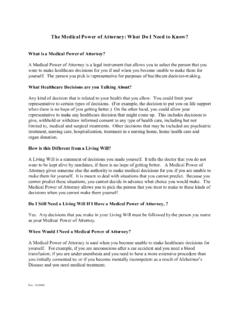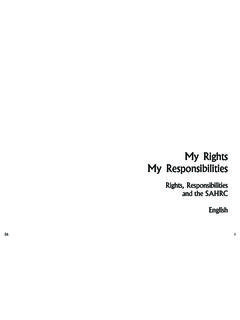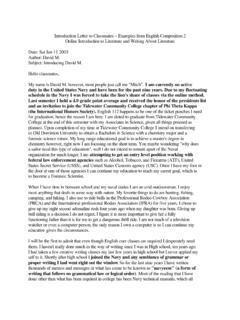Transcription of WHAT HAPPENS TO MY HOME IF I NEED LONG …
1 Attorney Timothy P. Crawford, CPA, CELA*, CAP** wanted to share this information with you. what HAPPENS TO MY home IF I NEED long TERM CARE? GREATER MILWAUKEE AREA OFFICES IN BROOKFIELD, GLENDALE, MILWAUKEE & RACINE Your Asset Protection Law Firm 840 Lake Avenue, Suite 200 Racine, WI 53403 (262) 634-6659 E-mail: Website: One concern for many who are thinking ahead to possible long term care needs is what effect government assistance has on home ownership. The following questions offer a brief introduction to this important issue. The government program most people look to is Medicaid, also known as Medical Assistance , , or Title 19 . It is a joint federal/state program established in 1965 under federal law. It is designed to help, among other people, those 65 years and older pay for medical care, including long term care.
2 IF YOU ARE MARRIED: 1. what will happen to our house if my spouse or I have to enter a nursing home ? Part of Medicaid law called spousal impoverishment protection rules protects, along with some savings and income, a couple s home . As long as one of you is living in the home when the other begins nursing home care, then the spouse at home is allowed to keep the home . 2. If my spouse or I enter a nursing home , is the other spouse required to stay in this house? No. You or your spouse can move from this home or sell it after the other spouse is in a nursing home . This move or sale of real estate will not affect the nursing home spouse s eligibility for Medicaid. 3. what will happen to our home if I apply for Medicaid home care benefits but am still living in the house? As long as the home is your main place of residence, you are allowed to keep it.
3 4. Can the government put a lien on our house if my spouse or I enter a nursing home and become eligible for Medicaid? No, as long as a nursing home resident has a spouse whether living in the residence or not, the government cannot put a lien on it. 25. Are there any government programs that provide long term care services in my home without my having to move out of my home ? Yes, in Wisconsin, Family Care helps elderly and disabled persons continue living in their own homes or in the community, rather than in a nursing home . A number of Wisconsin counties operate a program called Family Care . This program provides long term care services at home or in assisted living and allows individuals to keep their homes. IF YOU ARE SINGLE, DIVORCED OR WIDOWED: 6. If I am single, may I keep my house if I need to go to a nursing home for a temporary stay?
4 Yes, if you enter a nursing home for a temporary stay, you are allowed to keep your home . However, you are required to give a written statement that you intend to return to this home . 7. If I am single, may I keep my house if I become a permanent resident at a nursing home ? You can keep your home if you can show either of the following: (a) a dependent relative lives in the home (See #8 below); or (b) you express your intent to return home . However, keep in mind that you will be responsible for maintaining your home . Those costs usually include paying taxes, utilities, mortgage and any repairs. 8. what if I can no longer live at home but I have a child who still wishes to remain there? Your child is allowed to keep your home only if he or she is a minor or meets the definition of disabled under Social Security regulations.
5 Generally, if you become a permanent resident of a nursing home with no intent of returning home , you will have to sell your home and spend down the proceeds from the sale of your home before you are eligible for Medicaid again. 9. Once I am in a nursing home can the government ever put a lien on my home ? Yes, if you are single, there are only a few conditions that allow the state to impose a lien against the home of a resident who receives Medicaid. The state must provide that: (a) you have no reasonable expectation of returning to the home from the nursing home ; (b) you do not have a spouse, a child under 21, or a disabled child of any age who lives in the home . The state must provide you with notice and the right to a hearing before imposing a lien. TRANSFERRING OR GIVING AWAY PROPERTY 10. Can I give my house to my children without if affecting my Medicaid eligibility?
6 Giving your money, home and many other assets to your children is considered a divestment. A divestment occurs when you transfer, gift away, or sell items for less than fair market value. Medicaid has a look-back period of five years. This means that the state will look back at all the transfers of property you made in the five years before 3applying for Medicaid. Therefore, you may not be eligible for Medicaid for a certain time period if you give away money or other assets in the five years before you apply for Medicaid. This is a complicated area; you should contact an elder law attorney for more information. 11. Are there any disadvantages to giving my home to my children besides a possible waiting period for Medicaid eligibility? Giving away your home is not always recommended.
7 In addition to the possible divestment penalty that might make you temporarily ineligible for Medicaid, you give up any control over the use of your property for the rest of your life. It also means giving up certain benefits of home ownership, such as tax advantages or the Homestead Tax Credit. This is a complicated area; you should contact an elder law attorney for more information. 12. Is there a way to give my house away without having to wait to apply for Medicaid? One option is to transfer ownership with a retained life estate . This means that you keep the right to live in or use the property during your lifetime and that you transfer ownership of your house (for example, to your children) only after you die. Example: Fred is 80 years old. He owns a home worth $100,000.
8 He hires a lawyer to transfer the home to his children with a retained life estate. This means that Fred has the right to continue living in the home for his entire lifetime. When he dies, his children become the full owners. During his lifetime, Fred must pay for the taxes and upkeep to preserve the home s value for his kids. By making the transfer but retaining a life estate, Fred made a divestment , but the amount of the divestment is less than if he had given away the home entirely. Thus, depending on your age, the amount of the divestment may be considerably less than a simple transfer. Another advantage is that your retained life estate does not count as an asset for determining eligibility if you do choose to apply for Medicaid. 13. what are the disadvantages of transferring ownership with a retained life estate?
9 If you enter a nursing home with a retained life estate, then it is assumed you are receiving a certain amount of rent. This assumed rent is important because Medicaid programs carry income restrictions. In addition, if this property is sold during your lifetime, you must share the sale proceeds. Finally, as indicated, the transfer is still considered a divestment for Medicaid eligibility purposes. Therefore, you may incur a waiting period before you become eligible, but it will most likely be shorter than if you had transferred the house entirely. Those Who Plan Ahead Win. Those Who Don t Plan Ahead Lose. This article is for informational purpose only and is not intended as legal advice. It is recommended that you call Timothy P. Crawford for a free conference to discuss your situation in more detail.
10 Attorney Crawford can be reached toll free at 1-888-634-6675. Please refer to this article when you call. Attorney Timothy P. Crawford is a Nationally Board Certified Elder Law Attorney(CELA). He has been Board Certified by the National Elder Law Foundation which has been approved as the Sole Certifying Organization for Elder Law Attorneys by the American Bar Association. Timothy P. Crawford was invited to join the Council of Advanced Practitioners(CAP) of the National Academy of 4 Elder Law Attorneys (NAELA) in August of 2005. CAP is a small group of premier elder law attorneys, all of whom have been members of NAELA for at least 10 years, are certified as elder law attorneys by the National Elder Law Foundation, and are AV rated by Martindale Hubbell, a service that provides an independent rating of the quality of attorneys, as one of the top attorneys in the nation.







